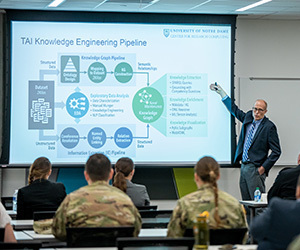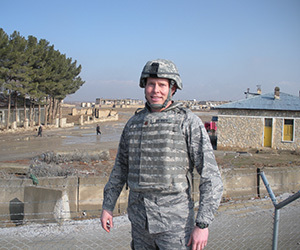Paul Brenner: Building a career of service
Paul Brenner, a ’98 graduate of Notre Dame, joined the Air Force ROTC program at the University while studying engineering as an undergraduate. In his senior year, he had to decide: go active duty or stay in the reserves and continue his education. He chose the latter. Since making that decision 24 years ago, Brenner has served on multiple deployments around the world. From 2008 to 2009 he engineered and built Air Force bases in Afghanistan. When he returned stateside, he helped build Notre Dame’s Center for Research Computing, where he currently serves as senior associate director and professor of the practice.
With a small but mighty staff of 50 people, Notre Dame’s Center for Research Computing supports $27 million in funding for research in advanced computing, computational biology, cybersecurity, data science, software and systems engineering and artificial intelligence.
Brenner broadened his expertise to include cybersecurity and cyberinfrastructure — which led to new opportunities with the United States Air Force. Brenner now serves as a reserve adviser to the USAF’s Air Education and Training Command, providing cybersecurity and cyberinfrastructure training for the largest educational organization in the United States — all part of a career of service to country, community and the classroom. Below is a Q&A with Brenner.
What does service mean to you?
I think of it as serving something bigger than yourself. Having a belief that there’s something bigger than our individual needs. Notre Dame does that. We believe, through faith and through service to the world — to do good is often to do something altruistic. I think there’s something altruistic to saying, “OK, I’m willing to go and follow orders and if need be, I’ll go into harm’s way, because I appreciate where I’m at today, I appreciate what I’ve been given, and I hope our children and our neighbors and the rest of our democratic country will also have those opportunities.”

Do you see that message resonate with your students and airmen?
Absolutely. I think in some regard, it’s the students we attract and the students we develop. There’s a student body here that wants to give back, wants to leave the world better than they found it, wants to make sure everybody has a home, make sure our cars are environmentally efficient, etc. ... There’s balance and prioritization — not just in a particular crisis but in all our life decisions. They’re able to say, “I can prioritize some basic necessities for myself but after that, let’s serve our country and the community.”
Many of our airmen, soldiers, sailors and Marines today come from a humble background, and working with these young men and young women with very different life experiences and even some hardships — I’m inspired that they’re still passionate about service and they’re passionate about doing good. They’re all looking to grow and succeed.
What aspects of your military service stand out to you?
Certainly, the leadership opportunity as far as the number of young men and women that we get to help in the defense of the nation. We get to lead them and get to grow them. Leadership in mission critical situations has given me a lot of opportunities for growth. I’m very thankful for the Department of Defense. I care about our country and participating in the defense of our democratic institution.
As far as my personal development, I’ve learned how to work within and be productive within a massive organization. The Air Force has given me the opportunity to travel and meet people from around the world. In the last five years alone, I’ve given cybersecurity briefings for the Department of Defense of the Philippines, was in Romania working with some of their senior folks in NATO cyber collaborations, trained allies in England on cyber mission analysis and supported managing our nuclear infrastructure.
How would you compare experiences in the military to campus?
There are absolutely some parallels. One example would be, you know, when we were in Afghanistan, there were times when an individual, an airman might feel isolated. They’re living in a plywood hut, they don’t have as much communication with family. They feel isolated from each other. So, your role is to help them be present in that time, and be productive.
And then years later, I had students here during COVID facing similar issues. We weren’t able to get out and see each other as much. People were feeling isolated. People weren’t able to communicate. Their normal was gone. Helping people through those moments of non-normal is one example. That certainly has been very helpful on both sides of the equation.

Starting out in ROTC as an undergrad, did you imagine the path your career would take?
I’m very thankful for this path. I think the correct path for me was always feeling like I was providing service to the betterment of the community. There are lots of ways to do that. For me it was faith that drove me to say, I will keep trying to serve in the capacities that are presented to me. I have certain things that I feel I’m good at, that I find interesting — STEM and technology has always been that for me.
To provide service in your career path, you look at your skill set. You work hard. My skill set leaned toward the technical. The doors were open to serve in the military, to come back and serve at Notre Dame, to build the Center for Research Computing — to use technology to aid all the great discoveries Notre Dame’s trying to make, whether that be next-generation energy sources or medical breakthroughs or even studying theological and philosophical texts. I’ve kept those doors open and balanced those opportunities with family. I tend to say — God, family, country, Notre Dame.
Latest Faculty & Staff
- In memoriam: Alasdair MacIntyre, the Rev. John A. O’Brien senior research professor of philosophy emeritusAlasdair MacIntyre, the Rev. John A. O’Brien senior research professor of philosophy emeritus and a permanent senior distinguished research fellow at the de Nicola Center for Ethics and Culture, died on May 21, 2025. He was 96.
- Santiago Schnell, dean of Notre Dame’s College of Science, appointed as provost of DartmouthSantiago Schnell, the William K. Warren Foundation Dean of the College of Science at the University of Notre Dame, has accepted an appointment as provost at Dartmouth College. He will depart Notre Dame at the end of June and begin his new role in July.
- Notre Dame’s Fightin’ Irish Battalion receives Department of Defense award as nation’s top Army ROTC programThe United States Department of Defense honored the University of Notre Dame’s Army ROTC Fightin’ Irish Battalion as the nation’s top Army collegiate program for the 2023-24 academic year. This will be the first time the unit has received the department’s Educational Institution Partnership Excellence Award, which recognizes the program’s achievements in recruiting, educating, training and commissioning leaders of character to be the next generation of military officers.
- In memoriam: Karl Ameriks, the McMahon-Hank Professor of Philosophy EmeritusKarl Ameriks, the McMahon-Hank Professor of Philosophy Emeritus at the University of Notre Dame, died on April 28 from pancreatic cancer. He was 77. Born in post-World War II Germany, Ameriks’ family emigrated to the United States when he was a child, and he grew up in Detroit, Michigan. He received his bachelor’s and doctoral degrees from Yale University. He came to the Department of Philosophy at Notre Dame in 1973 during a formative time for the department, which had transitioned from a predominantly Thomist focus to the more analytical American philosophy in the 1960s.
- Notre Dame psychologist explores how children best learn math — and yes, timed practice helpsUniversity of Notre Dame professor of psychology Nicole McNeil recently co-authored a report that examines the best way for children to learn arithmetic — whether that’s by memorizing number values and multiplication tables, or by studying math at a deeper, conceptual level. The report, “What the Science of Learning Teaches Us About Arithmetic Fluency,” was published in the journal Psychological Science in the Public Interest and shows that children learn most effectively when instruction follows an evidence‑based cycle: grounding facts in conceptual understanding, using brief timed practice to make those facts automatic, and then returning to discussion and reflection to deepen that knowledge.
- ’Tis the season for ticks and mosquitoes. A medical entomologist talks about these pests and how to avoid them.Notre Dame expert Lee Haines explains the risks mosquitoes and ticks pose to the Midwest and discusses how the public can best protect themselves and family members (including pets) from these bloodthirsty pests.












